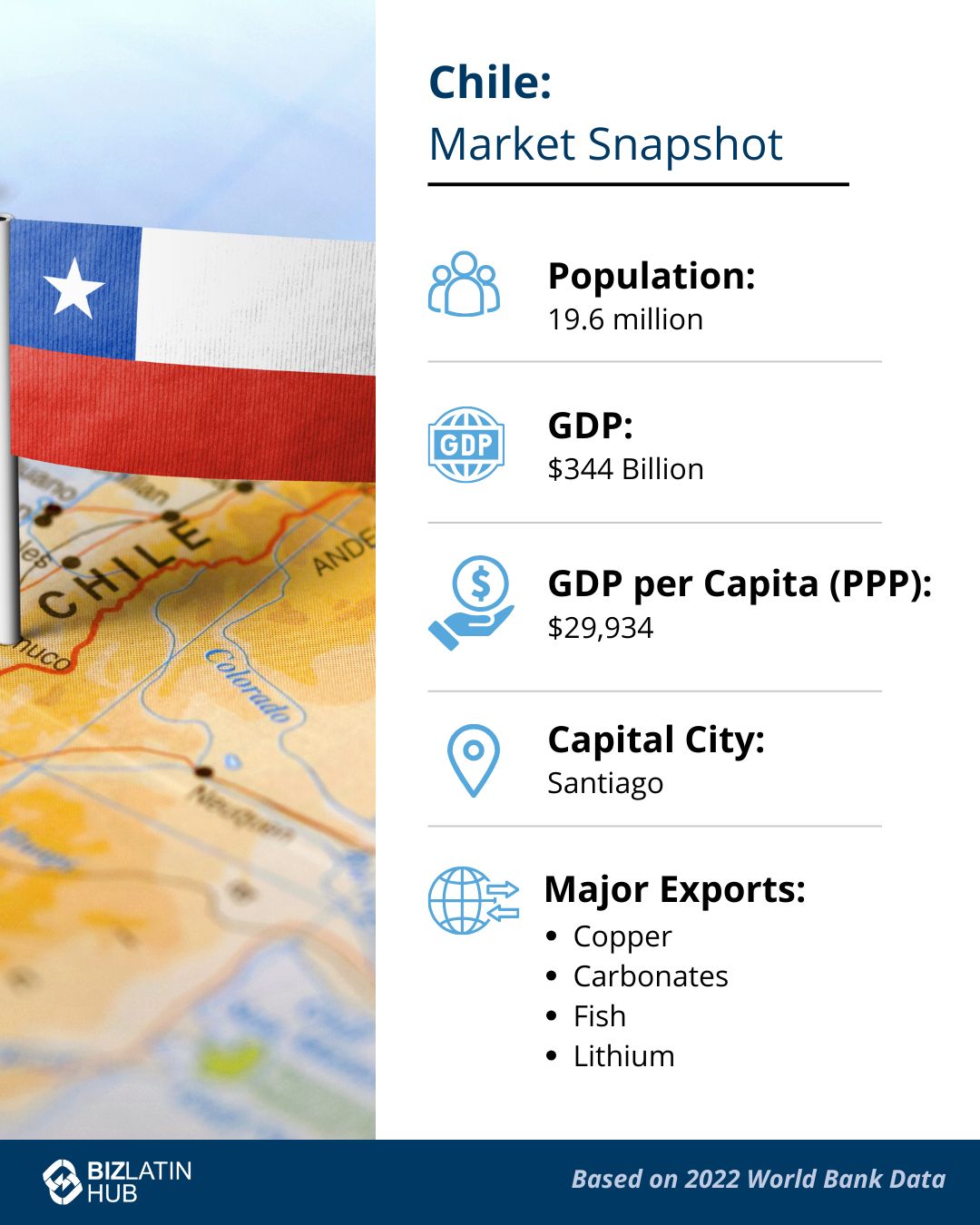Explore the opportunities and considerations for doing business in Chile in 2025, including insights into key sectors, legal frameworks, and strategic advantages for foreign investors.
Doing business in Chile in 2025 offers foreign investors access to a stable and open economy, bolstered by transparent regulations and a commitment to international trade. First, doing business in Chile provides access to a stable and open economy within Latin America.
Known for its transparent regulations and efficient bureaucracy, the country consistently ranks high in ease of doing business. In addition, doing business in Chile provides access to numerous free trade agreements, which serve as a gateway to markets around the world. Whether you are a seasoned entrepreneur or a budding investor, business prospects in Chile offer a promising avenue for growth and success.
Chile’s commitment to innovation and technology, coupled with a highly skilled workforce, makes it an ideal destination for companies looking to expand their horizons. Furthermore, being an entrepreneur in Chile comes with tax incentives and investment protections, creating a favorable environment for growth and profitability. In summary, doing business in Chile opens doors to a dynamic, investor-friendly economy with a solid track record of success and a bright future ahead.
If you have any questions or inquiries about how to set up a company in Chile, our local experts can help out. We are used to doing business not only in the country but all over the region. Companies doing business in Chile benefit from its extensive network of free trade agreements, efficient bureaucracy, and a highly skilled workforce.
Doing business in Chile – International trade

The country continues to employ policies that promote international trade and is a member of the Pacific Alliance, the Rio Group, Mercosur, APEC, and UNASUR. With a business environment that promotes foreign investment in practically every sector and a growing start up ecosystem, it is no wonder that Chile is a favorite destination for entrepreneurs.
According to the Doing Business study published by the World Bank, Chile is the 59th easiest country to do business in.
Foreign investors in Chile may access all productive activities freely, especially in the food, infrastructure, tourism, energy, and mining industries; there are some restrictions in certain sectors such as in the maritime, media, and air transportation sectors. The mining sector in Chile for instance, is full of opportunities for foreign investment. According to the Invest Chile website, these are the best areas within the mining industry for international investment:
- Scale-up of technology in continuous-operation consumables.
- Transition from open-pit to underground operation.
- Integrated autonomous operations.
- Solutions to minimize energy consumption in milling and hydrometallurgical processes.
- Technologies to control impurities in concentrate.
- Technologies for efficient treatment of tailings.
- Modernization of smelters and refineries.
- Exploitation of rare earth elements.
- Exploration projects.
However, someone investing in the mining sector in Chile will need to secure a diversity of permits and official authorizations. Therefore, it is always better to consult with a lawyer familiarized with the mining sector in Chile before deciding to invest.
Incentives for foreign investors in Chile
Another reason to incorporate a company in Chile is the incentives offered for both local and foreign investors. The government does not subsidize foreign investment, but it does offer incentives when businesses help remote regions such as Tarapacá, Aysen, Arica and Pariancota, Magallanes, Palena and Chiloé.
Key sectors for doing business in Chile include mining, energy, agriculture, technology, and infrastructure, each offering unique opportunities for investment and growth.
They also offer incentives for micro or small and medium sized enterprises involved in technology. For instance, Chile conceived StartUp Chile, a USD$40 million program in which entrepreneurs receive grants of USD$14,000, USD$30,000 or USD$80,000 depending on the size of their business – and a work visa to accelerate or develop their start-ups in Chile.
Why Chile Remains a Prime Investment Destination in 2025
Chile continues to be a top choice for foreign investors in 2025, offering a stable political environment, strategic geographic location, and a pro-business government. The country’s commitment to infrastructure development and economic diversification further enhances its appeal.
Key reasons to invest in Chile:
- Stable Economy – Chile boasts one of the most stable and prosperous economies in Latin America, with consistent growth and low inflation.
- Transparent Regulations – The country’s transparent legal and regulatory framework facilitates ease of doing business.
- Extensive Trade Agreements – Chile has numerous free trade agreements, providing access to markets around the world.
- Skilled Workforce – A highly educated and skilled workforce supports diverse business operations.
- Innovation and Technology – Chile’s commitment to innovation and technology makes it an ideal destination for companies looking to expand their horizons.
Local Tip:
When establishing a presence in Chile, consider leveraging the benefits of special economic zones and government incentives to maximize operational efficiency and cost savings.
Company formation in Chile
To start a company in Chile, foreign investors must choose a legal structure (commonly a Sociedad por Acciones or Sociedad de Responsabilidad Limitada), register with the Business Registry, obtain a Tax Identification Number (RUT) from the Internal Revenue Service (SII), and comply with local labor and tax regulations. The process typically takes 2–4 weeks with proper legal assistance.
Doing business in Chile requires compliance with local regulations, including company registration with the Business Registry, obtaining a Tax Identification Number (RUT), and adhering to labor and tax laws.
Local Insight for 2025:
Chile’s commitment to economic diversification and infrastructure development continues to create new opportunities for foreign investors, particularly in sectors aligned with sustainable growth and innovation.
FAQs When doing business in Chile
Answers to some of the most common questions we get asked by our clients.
1. Can a foreigner own a business in Chile?
Yes, a business can be 100% foreign-owned by either legal persons (legal entities) or natural persons (individuals).
2. How long does it take to register a company in Chile?
It takes 6 to 8 weeks to register and set up an operating company in Chile, contingent upon the timely submission of all necessary documents.
3. What does a SpA company name mean in Chile?
The SpA in a company name in Chile refers to a Sociedad por Acciones, which is similar to a joint stock company. This corporate entity allows for shares to be easily bought and sold. One or more individuals or legal entities can establish the structure, which offers flexibility in terms of capital management. Due to its adaptability and capacity for a variety of investments and shareholders, businesses and entrepreneurs frequently choose it.
4. What does an LTDA company name mean in Chile?
LTDA in a company name in Chile refers to a Sociedad de Responsabilidad Limitada, which is similar to a Limited Liability Company. Partners’ liability is limited to their contributions to the company’s capital. In an LTDA, partners are not personally responsible for the company’s debts beyond their investment, providing a level of protection for individual assets. Small to medium-sized businesses frequently use it in Chile because it combines elements of partnership and corporate structures, providing flexibility and legal protections.
5. What entity types offer Limited Liability in Chile?
LTDA in a company name in Chile refers to a Sociedad de Responsabilidad Limitada, which is similar to a Limited Liability Company. Partners’ liability is limited to their contributions to the company’s capital. In an LTDA, partners are not personally responsible for the company’s debts beyond their investment, providing a level of protection for individual assets. Small to medium-sized businesses frequently use it in Chile because it combines elements of partnership and corporate structures, providing flexibility and legal protections.
6. Is Chile a good country for doing business in 2025?
Yes. Chile offers a stable economy, transparent regulations, and investor-friendly policies, making it an attractive destination for foreign businesses.
7. How long does it take to start a company in Chile?
With legal support, incorporation and registration can take approximately 2 to 4 weeks, depending on the business structure and sector.
8. What types of businesses succeed in Chile?
Businesses in mining, energy, agriculture, technology, and infrastructure thrive due to Chile’s strategic advantages and supportive regulatory environment.
Need Local Support in Doing Business in Chile?
With these and many other reasons, doing business in Chile makes sense for many visitors. It is advisable to cooperate with a local partner to identify the best market entry path, in addition to the required steps of the Chile company incorporation process should you wish to start a local company.
If you’re considering doing business in Chile in 2025, Biz Latin Hub offers comprehensive support for company formation, legal compliance, and strategic market entry.
Biz Latin Hub, a local law firm with a global perspective is the perfect partner to help you undertake your business in Chile. We offer a great variety of back-office services in most Latin American countries. If you have any queries, do not hesitate and contact our Country Manager here at Biz Latin Hub.
Learn about our team and expert authors.






